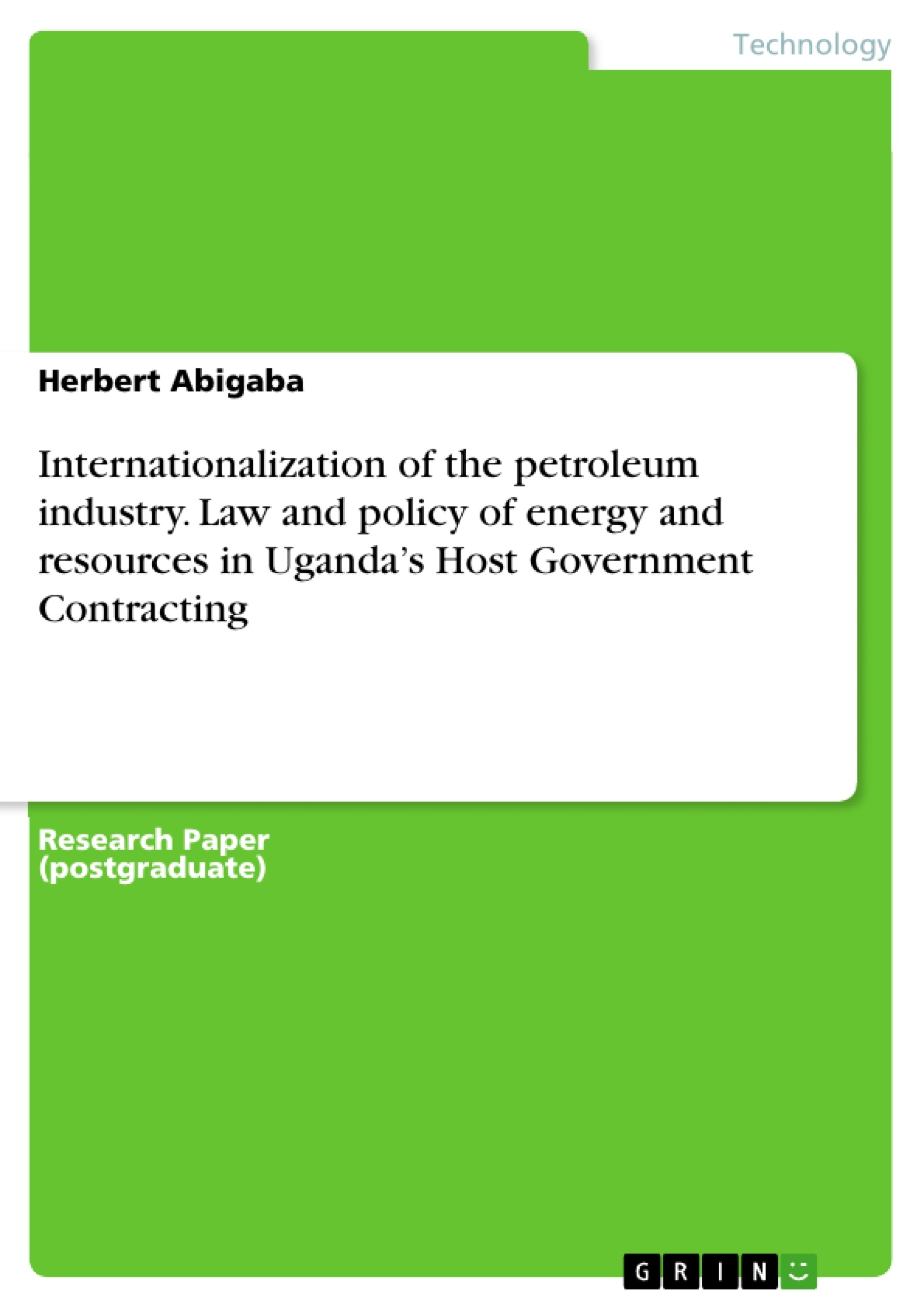This paper discusses the internationalization of the petroleum industry as witnessed within Uganda’s petroleum legal and regulatory framework, drawing heavily on the Host Government Contracts (HGC). The country is selected for a number of reasons. First, the framework relates strongly with the other countries across East Africa, a region that is profoundly becoming a new petroleum frontier.1 Second, Uganda’s commercial oil discoveries realized in early 2006 have since increased to become the largest on-shore oil reserves in the Sub-Sahara Africa (SSA) over the last 20 years.2 Third, this ‘black gold’ potential has seen strong foreign interest, especially over the last ten years with country now pitted to become a top-50 oil producer in the mid-term if the development plan is achieved.3 As a result, the country has witnessed legal, regulatory and policy reforms; strongly over the last ten years, aimed at improved management of the nascent industry as shall be discussed.
The paper is structured as follows. In the first section, a chronological development of country’s petroleum legal, regulatory and policy framework is discussed. Section two explains the HGC that has been employed in Uganda to manage its hydrocarbon resources. In the third section, internationalization of the industry as reflected in Uganda’s framework is considered. Although the focus is on host government contracting, the interdependence with the public law framework that governs it is appreciated. For this reason, the discussion permeates beyond the HGCs to include this framework. While it is adduced that internationalization within Uganda’s legal system is apparent and still progressing, the paper suggests that developing countries face some specific challenges. In the last section, these challenges are assessed along with recommendations to remediate them, and entrench this narrative.
Inhaltsverzeichnis (Table of Contents)
- Introduction
- Legal Background to Uganda's Petroleum Sector
- Preliminary petroleum exploration in Uganda
- Post-2006 Era
- Uganda's Host Government Contract
Zielsetzung und Themenschwerpunkte (Objectives and Key Themes)
This paper examines the internationalization of the petroleum industry, particularly in Uganda's legal framework. It focuses on the Host Government Contracts (HGC) used in Uganda to manage hydrocarbon resources.- The evolution of Uganda's petroleum legal framework
- The role of Host Government Contracts (HGCs) in managing hydrocarbon resources
- Internationalization of the petroleum industry as reflected in Uganda's framework
- Challenges faced by developing countries in internationalizing their petroleum sectors
- Recommendations for addressing these challenges
Zusammenfassung der Kapitel (Chapter Summaries)
- Introduction: This introductory chapter presents the context of the paper, highlighting the relevance of Uganda's case study in relation to East Africa's emerging petroleum frontier. It outlines the structure of the paper and its focus on internationalization within the legal framework.
- Legal Background to Uganda's Petroleum Sector: This chapter provides a chronological overview of the legal and regulatory framework governing Uganda's petroleum sector. It examines the development of laws and regulations from the early exploration efforts in the 1920s to the post-2006 era, marked by major commercial oil discoveries. The chapter highlights the impact of key legislation, including the Petroleum (Exploration and Production) Act of 1985, the National Oil and Gas Policy (NOGP) of 2008, and the subsequent Petroleum (Exploration, Development and Production) and (Refining, Transmission and Storage) Act(s) of 2013.
- Uganda's Host Government Contract: This chapter focuses on the Host Government Contracts (HGCs), specifically the Production Sharing Agreement (PSA) type used in Uganda. It defines HGCs and explores their role in granting rights to private companies to explore and develop hydrocarbons. The chapter explains the main features of Uganda's PSA model, including royalty payments and cost oil deductions.
Schlüsselwörter (Keywords)
The key themes and concepts of the paper revolve around the internationalization of the petroleum industry, particularly in the context of developing countries like Uganda. The paper emphasizes the importance of Host Government Contracts (HGCs), specifically Production Sharing Agreements (PSAs), in managing hydrocarbon resources and attracting foreign investment. Other important concepts include the evolution of legal frameworks, challenges faced by developing countries, and recommendations for improving the management of petroleum sectors. The paper also touches upon the role of international oil companies (IOCs) in influencing host-state interests and the need for balancing economic development with national aspirations.Frequently Asked Questions
What is the focus of Uganda's petroleum legal framework?
The framework focuses on the management of nascent hydrocarbon resources, particularly through Host Government Contracts (HGCs) and regulatory reforms following commercial oil discoveries in 2006.
What type of Host Government Contract does Uganda use?
Uganda primarily employs the Production Sharing Agreement (PSA) model, which includes specific features like royalty payments and cost oil deductions for private companies.
How has the industry in Uganda internationalized?
Internationalization is reflected in the adoption of international legal standards, increased foreign interest from oil companies, and policy reforms aimed at attracting global investment.
What are the major legislative acts governing Uganda's oil sector?
Key legislations include the Petroleum (Exploration and Production) Act of 1985, the National Oil and Gas Policy of 2008, and the comprehensive Petroleum Acts of 2013.
What challenges do developing countries face in the petroleum industry?
Developing countries often struggle with balancing national aspirations against the influence of International Oil Companies (IOCs) and managing the transition to becoming a major global producer.
- Quote paper
- Herbert Abigaba (Author), 2014, Internationalization of the petroleum industry. Law and policy of energy and resources in Uganda’s Host Government Contracting, Munich, GRIN Verlag, https://www.grin.com/document/280812



